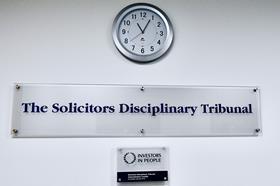The Solicitors Disciplinary Tribunal has decided to hear a ‘SLAPP’ hearing in private after it opened in public following a breach of its anonymity order.

Christopher Mark Hutchings, a partner at London firm Hamlins LLP and head of the entertainment, marketing and intellectual property department, is facing a week-long hearing before the SDT over allegations that in a telephone call with Solicitor G he ‘untruthfully and dishonestly’ stated that counsel had advised that 'client A' had a strong case for bringing contempt proceedings.
Hutchings, admitted in 1992, denies all wrongdoing.
The hearing, before a three-person panel, began yesterday and a report was subsequently published online by The Times in which one of a number of individuals covered by an anonymity order, imposed by the tribunal at an earlier hearing, was named. The article has since been removed.
The anonymity order was approved by the SDT to protect legal professional privilege. Parts of the hearing, concerning a consent order, a phone call and its aftermath, would also be heard in private, the tribunal ordered in June this year.
At the start of the second day of the substantive hearing, Paul Ozin KC, for the Solicitors Regulation Authority, told the tribunal that the anonymity breach by the newspaper was not enforceable as a contempt of court.
Read more
Ben Hubble KC, for Hutchings, described the anonymity breach as a ‘troubling development’. He added: ‘Client A is not here and I am not representing Client A but I do feel obliged to say if Client A was represented and was here, they would be submitting the [anonymity] regime needs to be overhauled to protect their position. I invite the tribunal to consider [the] whole of this hearing to be in private.
‘There is a concern that it is in fact likely that Client B’s privilege will be lost by parts of the hearing being heard in public. Once client B’s name is out there, all the redactions to the skeleton argument becomes worthless. Whilst open justice is a very important principle…it is not just outweighed, it is trumped by the need to protect privilege of client A and, I do not know what client B’s position is, but client B’s as well.’
Delivering the panel’s decision, the SDT panel chair Lisa Boyce said: ‘The order was breached as a consequence the name of Client B means we cannot adequately protect privilege of Client B in a public session. We will switch to a private session.’






























